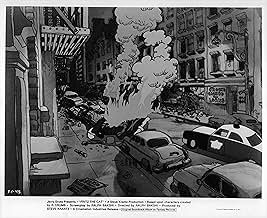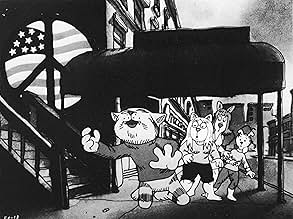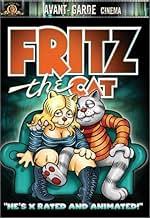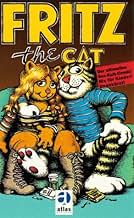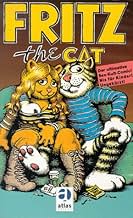CALIFICACIÓN DE IMDb
6.2/10
15 k
TU CALIFICACIÓN
Ambientada en los barrios populares de Nueva York. La historia se desarrolla en la década de los 60, gira alrededor de un gato pervertido en su búsqueda del amor en los lugares menos indicad... Leer todoAmbientada en los barrios populares de Nueva York. La historia se desarrolla en la década de los 60, gira alrededor de un gato pervertido en su búsqueda del amor en los lugares menos indicados.Ambientada en los barrios populares de Nueva York. La historia se desarrolla en la década de los 60, gira alrededor de un gato pervertido en su búsqueda del amor en los lugares menos indicados.
- Dirección
- Guionistas
- Elenco
Rosetta LeNoire
- Bertha
- (voz)
- …
John McCurry
- Blue
- (voz)
- …
Ralph Bakshi
- Narrator
- (voz)
- (sin créditos)
- …
Charles Spidar
- Bar Patron
- (voz)
- (sin créditos)
- …
- Dirección
- Guionistas
- Todo el elenco y el equipo
- Producción, taquilla y más en IMDbPro
Opiniones destacadas
I came across the recently released DVD of this film in, of all places, the children's video section of Virgin Megastore. Whether or not this poorly miscategorized placement was of simple ignorance or whether the intent weas subversive and it was intentionally and deliberately placed in the children's section, I found myself grinning and reluctant inform anyone of the error. After all, nobody gave me any forewarnings when I was a kid either, as some things you just have to discover on your own, and the thought of some poor innocent parents popping this film on for their kid only to look on in horror at the visions that would soon unfold sounded dastardly and funny indeed.
I was 7 years old when Fritz the Cat first hit the screen, and while I didn't see the film for the first time until I was well into my twenties, the film nevertheless had a lasting impact on my childhood. This film had taken on a reputation of mythical proportions in my Brooklyn hometown neighborhood, partly due to the older teens on my street who were all too eager to share shocking details contained therein, as only the best subversive intentions can do, and further securing the film's status as "every parent's nightmare". To a child about to undergo serious growing pains and a naturally growing curiosity towards all things "adult-related", Fritz the Cat was very much my earliest childhood memory of the themes of sex, drugs, rock-n-roll, racism, you name it, and it was a symbol for naughtiness that all coming of age kids couldn't wait to catch a sneak peak of, or at least couldn't wait to reach the age when we could view such subject matter freely.
As a movie, it hasn't lost any of it's impact in 30 years, and fewer films truly capture the grittiness and raw edge of New York city in the 70's (French Connection is another good example). I dare say that it could be considered more offensive now than ever, as I fear that today many just might not "get it," despite our self-proclamation that we've come a long way in maturity and tolerance of such sensitive issues. Modern society has become so politically correct and desensitized to controversial issues that we're less tolerant and understanding of the original intent of a film such as this, especially when it's messages are not consistent with our modern value system. Thus, some of the obvious stereotypes presented in this film (such as the pigs portraying cops and the crows portraying blacks, for example), could never be presented in a film today. Granted, these images were meant to be offensive in the 70's as well, but they were obviously taken in a different light back then, as they were indicative of a specific brand of biting satire found in the 70's and hippie culture and a reflection of how that particular generation could openly address such social issues. These issues, such as racism, are clearly still relevant today, we just address them in a different manner, which is why Fritz the Cat still has potency yet is more or less looked upon as a curious time capsule of a bygone era today.
I was 7 years old when Fritz the Cat first hit the screen, and while I didn't see the film for the first time until I was well into my twenties, the film nevertheless had a lasting impact on my childhood. This film had taken on a reputation of mythical proportions in my Brooklyn hometown neighborhood, partly due to the older teens on my street who were all too eager to share shocking details contained therein, as only the best subversive intentions can do, and further securing the film's status as "every parent's nightmare". To a child about to undergo serious growing pains and a naturally growing curiosity towards all things "adult-related", Fritz the Cat was very much my earliest childhood memory of the themes of sex, drugs, rock-n-roll, racism, you name it, and it was a symbol for naughtiness that all coming of age kids couldn't wait to catch a sneak peak of, or at least couldn't wait to reach the age when we could view such subject matter freely.
As a movie, it hasn't lost any of it's impact in 30 years, and fewer films truly capture the grittiness and raw edge of New York city in the 70's (French Connection is another good example). I dare say that it could be considered more offensive now than ever, as I fear that today many just might not "get it," despite our self-proclamation that we've come a long way in maturity and tolerance of such sensitive issues. Modern society has become so politically correct and desensitized to controversial issues that we're less tolerant and understanding of the original intent of a film such as this, especially when it's messages are not consistent with our modern value system. Thus, some of the obvious stereotypes presented in this film (such as the pigs portraying cops and the crows portraying blacks, for example), could never be presented in a film today. Granted, these images were meant to be offensive in the 70's as well, but they were obviously taken in a different light back then, as they were indicative of a specific brand of biting satire found in the 70's and hippie culture and a reflection of how that particular generation could openly address such social issues. These issues, such as racism, are clearly still relevant today, we just address them in a different manner, which is why Fritz the Cat still has potency yet is more or less looked upon as a curious time capsule of a bygone era today.
That is how the 1960s were described by the narrator in the beginning of this film. Fritz the Cat is a famous movie for a number of reasons, most stemming from it being the first feature-length adult cartoon and having an "X" rating. There were controversies surrounding its creation with director Ralph Bakshi and character creator Robert Crumb. The film is like nothing I have ever seen before. It has a unique animation process that makes everything reek seediness, despair, and cry for social change. Bakshi wrote the script which really is nothing more than the knife that cuts through all the 60's BS - from existentialism to the drug culture to the love generation to African-American perspectives to militancy. Nothing is spared as the counterculture is laid bared and examined through the eyes, ears, fears, and desires of Fritz the Cat. Along the way, Fritz experiments with just about anything - including lots of sex, drugs, and sex. While the film definitely is quite vulgar in many ways with some of the most odious characterizations of otherwise cute and cuddly animals and depicting lots of strong sexual situations(though in no way deserving the "X" by today's standards), Fritz the Cat is also an intelligent look at one character's drive to find himself and meaning in his life - perhaps a symbol for the whole decade the film is examining. The end result is nothing conclusive - also perhaps a symbol. Bakshi's script is in some ways profound and thought-provoking and in some ways infantile and vile - his obvious dislike of police just one example. But what had my attention more than anything else was the animation - particularly in exterior shots not containing characters. There is one scene where the slums of Harlem are integral to the story. Bakshi uses his camera to zoom in on quite an impressive animated background shot of a field lost amongst the slums of Harlem. It is the very essence of seedy existence in an uncaring world. There are many other shots too that have that same power, but let's not forget that even with the intelligent at times script and the animation, much of Fritz the Cat is used solely to arouse - either arouse some primal feelings or arouse offense. A landmark film at any rate whether for good or for bad.
From what I had heard of this film and the other user comments posted, I was expecting a simple little shock cartoon. What I got was good kick in the pants. And I mean that in a good way. "Fritz the Cat" in many ways exposes the 1960's more than the live action films of its own decade.
The movie starts with 3 construction workers talking on top of an unfinished building. The dialogue is very spontaneous and almost seems ad-libbed. These types of conversations are sprinkled throughout the 80 minute film.
It then transitions to Fritz the cat, a college student who, like many of that era I'm sure, is not sure what it's all for. He decides to "do something real" and ventures into Harlem. From here he meets a wide assortment of people, incites a riot, and has sex with many a woman. It may not always have a point, but the movie has one fun segment after another with little breathing room. Sometimes unnecessarily shocking, sometimes surprisingly inspired, but always quick on its feet.
So please give it a chance. It's a lot more than the notorious cartoon porn it's been labeled as. It's a fun romp through the deprived New York of the 60's, except this time with cartoon characters! What's not to like?
7/10
The movie starts with 3 construction workers talking on top of an unfinished building. The dialogue is very spontaneous and almost seems ad-libbed. These types of conversations are sprinkled throughout the 80 minute film.
It then transitions to Fritz the cat, a college student who, like many of that era I'm sure, is not sure what it's all for. He decides to "do something real" and ventures into Harlem. From here he meets a wide assortment of people, incites a riot, and has sex with many a woman. It may not always have a point, but the movie has one fun segment after another with little breathing room. Sometimes unnecessarily shocking, sometimes surprisingly inspired, but always quick on its feet.
So please give it a chance. It's a lot more than the notorious cartoon porn it's been labeled as. It's a fun romp through the deprived New York of the 60's, except this time with cartoon characters! What's not to like?
7/10
I came of age in New York City during the 1960s and shared many of the same trials and tribulations of Fritz the Cat. It's hard to find your kicks when everyone around you is spaced out and hung up on aggression. All us long-hairs got a bad rap, like Fritz, because we were confused about what it is we wanted. For those of us who lived, we began to age to the point of getting knowledge and understanding. Of course by the time we understood that it was too late to do anything about it. The scene was too weird and we were too confused. Fritz the Cat is like a lot of the guys I hung around with; full of ideas and short on ambition. This film is a perfect view of what some people saw in the 1960s. 3 1/2 stars out of 4.
I'll take back every negative thing I said about Ralph Bakshi. I gave "Wizards" a second chance and now, instead of saying it was "An Animated Mess," it is a cult classic that works as comedy. It took me a while to warm up to Bakshi, but the more I got used to him, I am now declaring him not only as "The Bad Boy of Animation," because that's what he always intended to be, but also as what I really want to think of him as - The Mel Brooks of animation - because his style is really hilarious, whether he intended on this or not. Take this as a compliment, Ralph, you are a very funny guy. Your work seems angry, but you make me laugh.
As for his movies, many of them are not for children, especially young ones. "Fritz the Cat" is his first, his foremost, and one of his best. But it is rated X, and the first theatrical cartoon to be rated X with all the cartoon nudity, graphic violence, and foul language. Here's a piece of trivia: Would anyone guess that the man doing the voice of Fritz the cat is actually Skip Hinnant, the same guy from the children's PBS educational show "The Electric Company" who played Fargo North, Decoder, and Hinnant worked on "Fritz" and "The Electric Company" in the same year? It's true, two vastly different worlds, but Hinnant has pleased both children and adults, and not necessarily at the same time.
Now let's cut to the movie. It may seem like a dumb adult cartoon, but it does make a statement about the hedonistic lifestyles of the 1960's and there is a lot of allegorical symbolism. Fritz and his fellow felines (looks at his three females in the bathtub scene) represents the sexual revolution, the crows represent low-life Negroes who engage in crime, rioting in Harlem, and pot-smoking, the pigs represent cops who chase Fritz everywhere and are out to bust Fritz, and there's a sadistic witch-like lizard who represents radical culture of the hippies and enjoys watching her rabbit friend beat up Fritz and his donkey girlfriend Harriet with a chain in a sanctuary.
There's something to offend everyone in Fritz, right down to the bathtub orgy in the beginning of the film, heavy dosages of full frontal nudity, hallucinations of bare breasts, Big Bertha, the floozy black crow who seduces Fritz by stuffing marijuana into his mouth, rabbis who get interrupted by Fritz fleeing from the police, a typical 1960's riot in Harlem started by big-mouthed Fritz, pigs as rogue cops (Notice that Ralph Bakshi does the voice of one of the cops who says "Duh. In fact, he mentioned he does all the "Duh" voices in his movies as part of his commentary track from "Wizards." In "Fritz," Bakshi calls his fellow partner, "Ralph," so no one will think that Bakshi is doing the voice of "Ralph," so to speak.), lizards as evil witches, and the list goes on.
The best thing about "Fritz" is that Bakshi seemed to have a lot of fun doing this, and everything worked. He really added the fun to "Heavy Traffic" and "Wizards." When Bakshi really wanted to do an adult animated film, it can work. It only got deadening with latter overproduced efforts such as "Lord of the Rings" and "Cool World," and one can easily see that Bakshi labored everything, rather than the naturalism in "Fritz," "Heavy Traffic" and "Wizards."
Today, adult animation is popular now on TV. In the 1970's, adult animation was used for the theater. Younger animators such as Trey Parker and Matt Stone, the creators of "South Park," and Seth McFarlane, the creator of "Family Guy," appear to be working under the influence of Bakshi, incorporating every bit of lewdness they could think of for their shows and characters. But it is really Bakshi who fathered adult animation, and Parker, Stone, and McFarlane are like his sons, and father knew best.
As for his movies, many of them are not for children, especially young ones. "Fritz the Cat" is his first, his foremost, and one of his best. But it is rated X, and the first theatrical cartoon to be rated X with all the cartoon nudity, graphic violence, and foul language. Here's a piece of trivia: Would anyone guess that the man doing the voice of Fritz the cat is actually Skip Hinnant, the same guy from the children's PBS educational show "The Electric Company" who played Fargo North, Decoder, and Hinnant worked on "Fritz" and "The Electric Company" in the same year? It's true, two vastly different worlds, but Hinnant has pleased both children and adults, and not necessarily at the same time.
Now let's cut to the movie. It may seem like a dumb adult cartoon, but it does make a statement about the hedonistic lifestyles of the 1960's and there is a lot of allegorical symbolism. Fritz and his fellow felines (looks at his three females in the bathtub scene) represents the sexual revolution, the crows represent low-life Negroes who engage in crime, rioting in Harlem, and pot-smoking, the pigs represent cops who chase Fritz everywhere and are out to bust Fritz, and there's a sadistic witch-like lizard who represents radical culture of the hippies and enjoys watching her rabbit friend beat up Fritz and his donkey girlfriend Harriet with a chain in a sanctuary.
There's something to offend everyone in Fritz, right down to the bathtub orgy in the beginning of the film, heavy dosages of full frontal nudity, hallucinations of bare breasts, Big Bertha, the floozy black crow who seduces Fritz by stuffing marijuana into his mouth, rabbis who get interrupted by Fritz fleeing from the police, a typical 1960's riot in Harlem started by big-mouthed Fritz, pigs as rogue cops (Notice that Ralph Bakshi does the voice of one of the cops who says "Duh. In fact, he mentioned he does all the "Duh" voices in his movies as part of his commentary track from "Wizards." In "Fritz," Bakshi calls his fellow partner, "Ralph," so no one will think that Bakshi is doing the voice of "Ralph," so to speak.), lizards as evil witches, and the list goes on.
The best thing about "Fritz" is that Bakshi seemed to have a lot of fun doing this, and everything worked. He really added the fun to "Heavy Traffic" and "Wizards." When Bakshi really wanted to do an adult animated film, it can work. It only got deadening with latter overproduced efforts such as "Lord of the Rings" and "Cool World," and one can easily see that Bakshi labored everything, rather than the naturalism in "Fritz," "Heavy Traffic" and "Wizards."
Today, adult animation is popular now on TV. In the 1970's, adult animation was used for the theater. Younger animators such as Trey Parker and Matt Stone, the creators of "South Park," and Seth McFarlane, the creator of "Family Guy," appear to be working under the influence of Bakshi, incorporating every bit of lewdness they could think of for their shows and characters. But it is really Bakshi who fathered adult animation, and Parker, Stone, and McFarlane are like his sons, and father knew best.
¿Sabías que…?
- TriviaThere is no evidence that Robert Crumb filed suit to have his name removed from the film's credits. Contradictory to this claim, Crumb's name continues to appear in the credits, even on home media releases. His name, however, does not appear in the credits for Las nueve vidas eróticas del gato Fritz (1974).
- ErroresWhen he emerges from the trash can, Fritz's outfit changes color from red to blue to red again between shots.
- Versiones alternativasWhen aired during the Groundbreakers block on Playboy, the scene of Harriet's rape is heavily edited. The movie is otherwise uncut.
- ConexionesFeatured in Precious Images (1986)
Selecciones populares
Inicia sesión para calificar y agrega a la lista de videos para obtener recomendaciones personalizadas
- How long is Fritz the Cat?Con tecnología de Alexa
Detalles
Taquilla
- Presupuesto
- USD 700,000 (estimado)
- Tiempo de ejecución1 hora 18 minutos
- Color
Contribuir a esta página
Sugiere una edición o agrega el contenido que falta

Principales brechas de datos
What is the French language plot outline for Fritz el gato (1972)?
Responda

